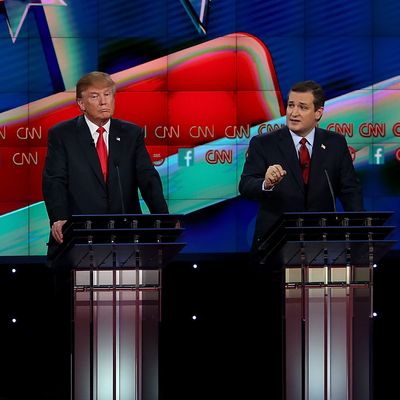
The CNN debate in Las Vegas tonight was long and monomaniacally focused on national security (with immigration treated as a national-security issue), but it departed mercifully on occasion from the standard Republican formula of conflating strength with puerile claims of strength, and military power with bellicosity. For significant stretches of time, some candidates disagreed over the basic strategic underpinnings of how the United States should deal with terrorist threats and with the related instability in the Middle East. Marco Rubio — occasionally backed by Jeb Bush, Chris Christie, and John Kasich — was at odds with Ted Cruz, who was largely in agreement with Donald Trump and Rand Paul. The former grouping essentially supports a return to Bush administration policies on domestic surveillance and law enforcement, including a belief in the revolutionary power of American arms in complex religio-political conflicts, and apparent faith in the “flypaper” theory that killing jihadis in murky overseas conflicts prevents acts like the San Bernardino murders. The latter group opposes military action to overthrow Bashar al-Assad (and retroactively, Muammar Qaddafi, Hosni Mubarak, and perhaps Saddam Hussein) in favor of a strict focus on violent action against ISIS and diplomatic opposition to Iran. Cruz has learned to describe both his military policies and his opposition to some forms of surveillance as a matter not of national self-restraint but of Reaganite focus.
Which side had the better of this debate within the debate? That probably depends on whether you think going back down the same road George W. Bush and his advisers trod is madness, or conversely, that the Cruz/Trump/Paul formula is too close to unacceptable Obama policies to (a) provide the requisite partisan differentiation against Hillary Clinton and (b) terrify America’s foes into better behavior — clearly a core Republican goal regardless of faction.
Without question, all the candidates decided at some point to abandon their disagreements and just bash Obama and Clinton as responsible for most of the world’s problems. But before that, Marco Rubio took some painful shots from the same tormentors, especially Cruz, for his crabwise movement on immigration policy, his crucial weakness in the eyes of angry and mistrustful elements of the GOP base. As part of his own decision to make himself the candidate of focus and clarity, Cruz categorically ruled out support for any path not only to citizenship but to legalization of undocumented Americans, placing himself implicitly in Trump’s deport ’em all camp, and inviting future questions about cattle cars and transit camps and other inconvenient aspects of radical nativism. Perhaps Iowa representative Steve King extorted this position as the price of his recent endorsement of the Texan.
In the end, Donald Trump showed why he has not only survived but thrived in this strange nomination process. A lot of the advance hype on this debate assumed it would revolve around statements of outrage with his no-Muslim-entry “proposal.” Jeb Bush gave it the old heave-ho, but as usual, managed to seem both over-calculated and lacking self-confidence. After that, Ted Cruz gave a dry and lawyerly statement of disagreement with Trump, and the issue faded. Trump was largely self-disciplined, except for a jejune shot at Bush for the sad state of his campaign, and most regular people out there probably don’t care that he clearly hasn’t the foggiest notion of the nuclear triad. And then he may have stolen the show by suddenly announcing he was comfortable as a Republican, and had no interest in running as an independent even if he loses the nomination (Trump actually clarified this into a flat pledge in post-debate interviews).
As for the other candidates, perhaps I’m being churlish, but it sure seems like time for some more winnowing of the field. I don’t know what’s more annoying about Carly Fiorina: her endless whining about lack of attention, her inability to utter a sentence without mentioning Hillary Clinton, or her Tiny Town projection of her experience as the failed CEO of HP with the responsibilities of a president. John Kasich seems to have a different rap in every debate, poorly and loudly delivered. Rand Paul seems like he’s trying to regain the confidence of his old man’s supporters, having failed as a viable presidential candidate. And Ben Carson actually did reasonably well tonight, but it would be better if he didn’t treat his campaign as an interruption of his book tour. If Chris Christie didn’t stand out in this debate, I don’t know when he ever will.
For those who believe Trump is doomed to fade and the nomination is going to be a Cruz-Rubio grudge match, this was a pretty important premonition of where the contest is headed. But Trump’s right: For all the talk about the Cruz Surge in Iowa, the Donald’s doing very well nationally, and at some point, when people start voting, excuses to dismiss his act as entertainment will fall flat.






























